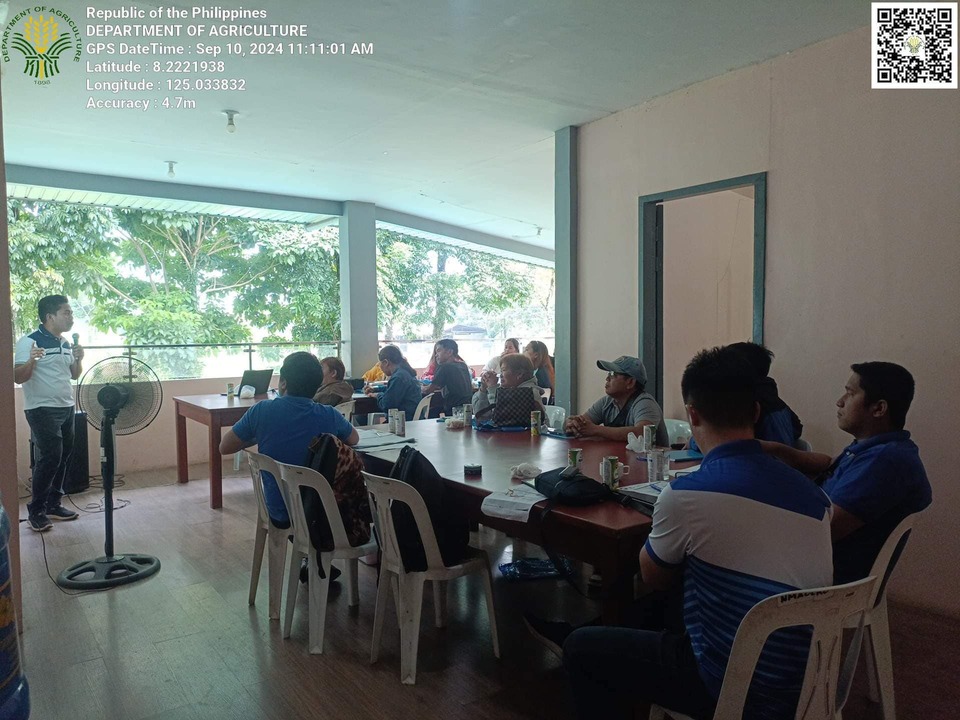
DA-10 through its Corn program spearheads a training on soybean production and processing for Bukidnon farmers.
MALAYBALAY CITY, BUKIDNON – To strengthen the local production and improve the quality of soybean and soybean-based products, the Department of Agriculture – Regional Field Office 10 (DA-10) staged recently a two-day Soybean Production and Processing Training at the Malaybalay Stock Farm, here.
Per Memorandum Order No. 15, Series of 2021, the Corn program is directed to continuously equip those involved in the soybean value chain, including the around 55 training participants — select chairpersons from different farmers’ cooperatives, associations (FCAs) in Bukidnon and regional agri technical staff — on the latest updates in the soybean sector, cultural management practices, and its significant role in the food and feed industries.
In her message, DA-10 Regional Technical Director for Operations Carlota S. Madriaga highlighted the importance of capturing the said crop’s package of technology, as soybean is a cheap alternative source of protein for animal feeds and its integration into the existing farming systems (cassava and sugarcane) as a cash crop, especially in the southern parts of Bukidnon, will provide additional income for farmers.
Besides cassava and sugarcane, Jemseal R. Tigbao, soybean focal person, also underscored that soybean can be intercropped with coconut, fruit trees, and vegetables, given that the majority of the country’s supply is still reliant on imports.
He detailed that it is a cropping practice that involves growing simultaneously two or more crops in proximity, thus boosting land productivity and maximizing yield per unit of land, and further setting up risk mitigation measures by breaking pest cycles and lowering the risk of infestations.
With Cassava being a subprogram of the Corn program, DA-10 targets at least 20% of the 14,582 hectares to be intercropped with soybean, and also fill the soybean requirement estimated at 30 metric tons annually.
To achieve this, Tigbao furthered that the department aims to increase local production and tap into emerging market opportunities.
Soybeans, with their different uses in products such as tofu (taho, tokwa), soy sauce, coffee substitutes, animal feed, oil, and flakes, present a promising market for the food and feed sectors.
Beyond such uses, Dafni C. Carreon, Science Research Specialist I, stressed the advantages of value-added soy products like soy milk, soyballs, and maruya, as it allows farmers to enter into lucrative markets, and at the same time diversify their income streams and maximize the returns on their soybean harvests.
For her part, Lorena V. Duna, chief of the Research Division, also stressed soybean’s health benefits, citing its high-quality protein and potential to improve lipid profile, reduce the risk of cardiovascular disease, coronary heart disease, and even certain cancers.
Several key topics were also discussed, including the Importance of Legumes in Agriculture, Soybean Pest and Diseases Management, Harvesting and Post-harvest Handling, and the Economics of Soybean.
“We are hopeful that through the [soybean] training, we have helped in empowering farmers with the knowledge and skills needed to capitalize on the economic and environmental benefits associated with soybean cultivation, while also promoting sustainable agricultural practices and contributing to food security”, Tigbao said.# (BJCE/Photos supplied)
